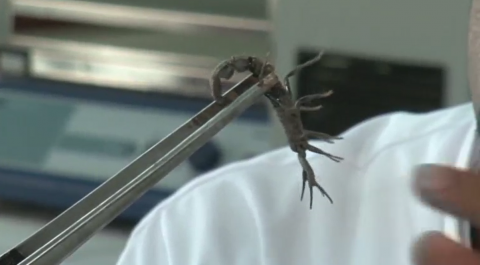
Extracting venom from scorpions can be a dangerous task.
The poisonous secretion can be fatal to humans but the venom, when broken down at a molecular level, contains hundreds of components that can be used in cancer research and to develop new drugs.
Manual extraction can also be harmful for the scorpions, as there is a risk of puncturing the venom gland.
Now scientists at Morocco’s Ben M’sik Hassan II University have found a safer way to ‘milk’ one of the world’s deadliest creatures.
The research team at the Casablanca university have developed a ‘scorpion-milking’ robot – a small device that can extract venom safely and quickly.
The remote-controlled robot, called VES-4, straps the scorpion’s tail and uses electricity to stimulate the venom glands to release poison, which is then safely stored.
The machine also allows larger quantities of venom to be extracted, and can extract venom from four scorpions at once.
“What makes it special is that it is safe and fast. If we were able to extract venom from ten scorpions daily in the past, today we can do it with up to 150 of them in a day. This means that the higher the quality and quantity of venom we can get, the better our research and results,” said Mouad Mkamel, a researcher at the university who, along with a group of university scientists, developed the machine.
Before developing the device, the researchers had to study each species of scorpion to find the right voltage to safely extract venom without harming the animal.
Another member of Mkamel’s team, director of the university’s health biology laboratory Rachid Saile, said he hoped they could extract venom components from Morocco’s scorpions that would prove to be unique to the country and put the university’s research in the spotlight.
“Our contribution will be the production, the characterization as well as collaborating with scientists, clinicians and the pharmaceutical industries to validate the molecules from the venom. I hope that one day, these molecules will be extracted from scorpions that live in Morocco only. This will gave more value to our work and to the research on venom,” Saile said.
The team are now waiting for their patent to be approved and to start mass-producing their machine.
And, according to the researchers, the business of scorpion-milking can be lucrative.
They said that a gram of venom can be sold for around $8000 (USD), with venom from rarer scorpions selling for up to $12,000 (USD) per gram.
(Reuters)







